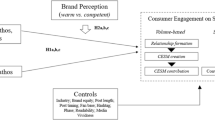Abstract
In the current social media marketing milieu, organizations are continuing to recognize the importance of concurrently managing brands, brand-consumer relationships, and brand communications while accounting for the transparency and openness incumbent of modern communication platforms (i.e., Facebook, Twitter, Google +, etc.). Organizations are not the only entities cognizant of the benefits and challenges of interacting with consumers in digital environments. At the heart of relationships are the interactions or communications between individual parties; this holds for brand relationships (Berne 1964; Fournier 1998). Research on branding has illustrated the importance of brand relationships on organizational success and longevity (Aaker 1991) and brand equity (Aaker 1997; Fournier 1998; Hollebeek 2011; Keller 2001). Fournier (1998) suggests that brand-consumer relationships are formed similarly to those formed with people, and social media is facilitating brand-consumer contact and making it easier for brands and consumers to interact.
Facebook, a social media platform where brands can engage with consumers, saw its revenue grow 51% in 2016 and with its acquisition of Instagram, another social media platform, is expected to continue to grow as brands continue to utilize its services to expand their reach, engage consumers, and perform relationship maintenance activities such as generating branded content (Rath 2017). Given the broad reach of social media and its ever-important role as a brand management tool, brand communications are critical. Social media provides marketers an opportunity to communicate specific brand and product attributes, affect, as well as communicate aspects of their personality to their consumers and make instantaneous adjustments in their language and communication habits to ensure consistency. In spite of the growing research and attention on social media within consumer research, few studies have sought to investigate the linguistic composition of social media content to better understand how brands are communicating critical components of their brand personality and dispositional characteristics such as emotions and sentiment. This exploratory research conducts a textual analysis of brand communications on Facebook to determine the linguistic features of brand personality, sentiment, and emotionality of brand posts and how these features differ across FCB Grid quadrants. Methodological approaches for linguistic analysis are also discussed.
Access provided by CONRICYT-eBooks. Download conference paper PDF
Similar content being viewed by others
In the current social media marketing milieu, organizations are continuing to recognize the importance of concurrently managing brands, brand-consumer relationships, and brand communications while accounting for the transparency and openness incumbent of modern communication platforms (i.e., Facebook, Twitter, Google +, etc.). Organizations are not the only entities cognizant of the benefits and challenges of interacting with consumers in digital environments. At the heart of relationships are the interactions or communications between individual parties; this holds for brand relationships (Berne 1964; Fournier 1998). Research on branding has illustrated the importance of brand relationships on organizational success and longevity (Aaker 1991) and brand equity (Aaker 1997; Fournier 1998; Hollebeek 2011; Keller 2001). Fournier (1998) suggests that brand-consumer relationships are formed similarly to those formed with people, and social media is facilitating brand-consumer contact and making it easier for brands and consumers to interact.
Author information
Authors and Affiliations
Corresponding author
Editor information
Editors and Affiliations
Rights and permissions
Copyright information
© 2018 Academy of Marketing Science
About this paper
Cite this paper
Cruz, R.E., Leonhardt, J.M. (2018). The Linguistics of Brand Interactivity: Communicating Brand Personality, Sentiment, and Emotionality on Facebook: An Abstract. In: Krey, N., Rossi, P. (eds) Boundary Blurred: A Seamless Customer Experience in Virtual and Real Spaces. AMSAC 2018. Developments in Marketing Science: Proceedings of the Academy of Marketing Science. Springer, Cham. https://doi.org/10.1007/978-3-319-99181-8_129
Download citation
DOI: https://doi.org/10.1007/978-3-319-99181-8_129
Published:
Publisher Name: Springer, Cham
Print ISBN: 978-3-319-99180-1
Online ISBN: 978-3-319-99181-8
eBook Packages: Business and ManagementBusiness and Management (R0)




